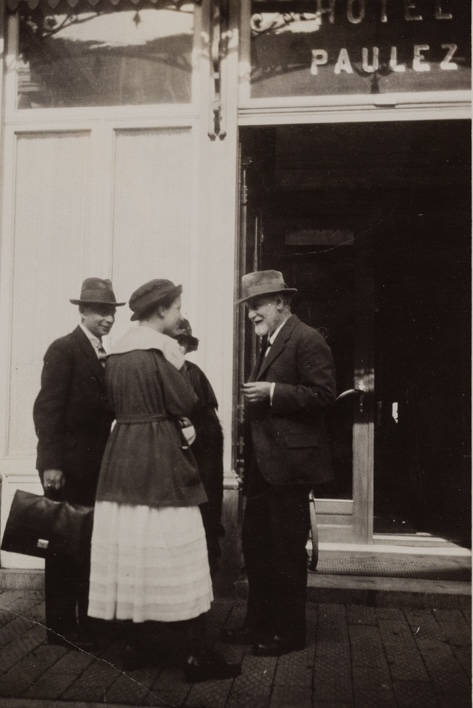Otto Rank (1884-1939) was an Austrian psychoanalyst who played a significant role in the development of psychoanalysis, particularly during his collaboration with Sigmund Freud.
Born as Otto Rosenfeld, he chose to change his name due to a turbulent relationship with his father. Otto Rank stood out as a bright and determined young man, despite facing precarious material conditions, he acquired vast knowledge through personal readings.

Anna Freud, Sigmund Freud and Otto Rank. Psychoanalytic Congress, The Hague, Netherlands, 1920
Relationship with Freud
His importance to Freud was immense, as Rank served as one of Freud’s closest collaborators for several years, tasked with overseeing the psychoanalytic movement and defending its mainstream position during disputes with Alfred Adler and Carl Jung.
His intellectual relationship with Freud was very close and he contributed significantly to the development of psychoanalytic theory, expanding it to the study of legends, myths, art, and creativity, as well as working closely with Freud on important projects such as The Interpretation of Dreams.
Exploring Therapeutic Techniques
However, the relationship between Rank and Freud began to deteriorate from 1920 onwards. Rank started to explore more active therapeutic techniques, in collaboration with Ferenczi, which challenged some of Freud’s fundamental ideas. His theory emphasized less the sexual aspects of psychic conflict, which displeased Freud and the traditionalists of psychoanalysis. Additionally, Rank proposed a more direct and abbreviated therapeutic approach, going against the more prolonged methods advocated by Freud. These differences led to growing tension between Rank and Freud, culminating in Rank’s departure from Freud’s inner circle and eventually from the traditional psychoanalytic movement.
Rank is also known for his work “The Trauma of Birth”, published in 1924. He argued that the experience of birth was a primordial source of anxiety and influence on human neuroses. This theory was a significant point of conflict between Rank and Freud, as Rank considered birth trauma to be more central to understanding neuroses than Freud’s Oedipus complex.
Influence and Legacy
At the end of his life, Rank settled in the United States, where he continued his career as a psychoanalyst and therapist. Despite his rupture with Freud and the traditional psychoanalytic movement, Rank found success in his practice and gained recognition for his contributions to psychotherapy and psychoanalytic theory. His influence can be seen in contemporary therapeutic approaches that value the therapeutic relationship and explore a variety of active techniques to promote psychological growth and healing. Otto Rank left a lasting legacy in the history of psychoanalysis and psychotherapy.



